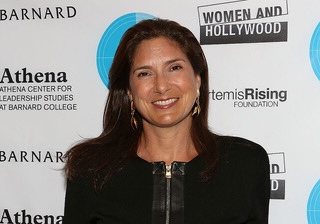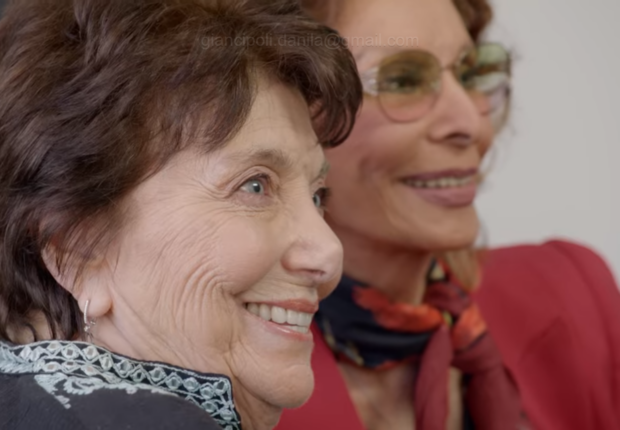Our interview with the producer of “WHAT WOULD SOPHIA LOREN DO?” now available on Netflix
Producer Regina K. Scully should have known better than to ask her Italian-American mother, Nancy, to try gluten-free pasta. Nancy glared at her daughter, responding, “What would Sophia Loren do?”
That simple retort sparked an idea for Scully, a longtime producer of hard-hitting documentaries that include “Athlete A,” “The Hunting Ground” and “The Invisible War.” Nancy, the daughter of immigrants, had gotten through good times and bad over the years by popping on a Loren movie at home. The Italian star’s characters seemed to always face situations Nancy could relate to her own life.
SEE ALSO: Eric Althoff’s interview of Jon Shenk and Bonni Cohen, directors of “Athlete A”
Perhaps there was a way for Scully to marry her New Jersey mother’s love of those films with an exploration of her family’s experiences, ranging from the very joyful to the extremely tragic. At the very least, getting her mother on tape would be a gift for Scully’s nieces and nephews.
“She loves Sophia not just because she’s a beauty and an international star but it was also the depth of Sophia and her characters. My mom picked up on that,” Scully told me this week for an interview for Screen Comment. “She knew what [Loren] had been through in her life and struggled with. Nobody handed her anything; she’s really a hard-working movie star.”
The documentary would be not only about Nancy’s love of Loren’s movies but the broader experience of being a child of immigrants. Nancy was actually born Vincenza, but her kindergarten teacher “renamed” her as a way to better integrate with her peers.
“My grandparents, who came over from Italy, were about the business of assimilation,” Scully said of Nancy’s parents not resisting their daughter’s new, Americanized, name.
Though at first vague on how this documentary about her mother might take shape, Scully nonetheless pitched the idea to her talent representatives in Los Angeles, who shared her enthusiasm. All she needed was a director.
“I wanted Ross Kauffman’s lens to be the final one creating the narrative,” Scully said of the director she hired to make “What Would Sophia Loren Do?” and with whom she had worked previously. “I also wanted to be on the outside looking in. Ross would see things I might not have seen or caught.”
Kauffman, who co-directed the Oscar-winning 2004 documentary “Born Into Brothels: Calcutta’s Red Light Kids” with Zana Briski, had previously made a documentary about Scully’s husband, John, and his 3,000-square-foot model train setup, called “Still Plays With Trains.” So he already knew the family.
“It started out as a much lighter subject where we were just going to follow the idea of this phrase,” Kauffman said of the five words that lent themselves to the short documentary’s title. “It really is sweet, but for us, we discovered how really poignant this is.”
“For my mom, even with all she’s been through, she’s very, very joyful,” added Scully. “I marvel at how much Ross captured in thirty minutes.”
Those trials include Nancy losing one of her adult children in an accident and nearly losing another to cancer. Through it all, Nancy had Sophia Loren’s movies to rely on.
“When Nancy started to really speak about Sophia in a deep and profound way was when she started showing us the films, and really talked about what the films meant to her and how Sophia’s life, like all of our lives, is full of the joys and difficulties we all experienced,” Kauffman said.
For the on-camera interviews, Scully said she had no idea what her mother might say when interviewed by Kauffman. Nothing was off-limits, but she did not expect her mother to discuss another of Scully’s brother’s experiences with sexual abuse in his youth.
“Recovery issues, starting in the arena of sexual abuse recovery, was my portal of entry into filmmaking,” Scully said. Indeed, this was the subject of “The Hunting Ground,” which dealt with campus rape, and “The Invisible War,” about the rape culture inherent in the military.
(“No one wanted to touch that film,” she said of “The Invisible War.” “This was back in 2010, pre-#MeToo.”)
Furthermore, after producing films on such heavy subjects, Scully thought some levity and positivity was needed. For as much as Scully’s mother had been through, Nancy seemed to always come through with a smile.
“We said let’s make a film about joy,” Kauffman mentioned. “And at the time of Covid, what people need is a bit of joy. Making this film kept me going through the last six months.”
It’s one thing to ponder what Loren might do under a particular set of circumstances; it was a whole other ballgame to ask the eighty-six year-old actress herself. Even for industry vets Kauffman and Scully, getting Loren to say “yes” to being interviewed—let alone perhaps meeting Nancy one on one—was no small challenge.
Scully used her Italian network to call in favors. And through Hollywood friends, Scully and co-producer Robin Honan managed to score a meeting with Loren’s son, Edoardo Ponti, who is also a filmmaker (Scully says such logistics “divinely crystallized.”) Scully charmed Ponti by relating that her mother had aprons that said “What Would Sophia Loren Do?” Ponti even sent one to his mother in Italy and got back a photo of her wearing same.
“We scheduled the call, so they actually spoke,” Scully said of finally getting her mother on the phone with her idol. “None of us know what they said because they only speak in Italian to each other.”
It seemed they were off and running, with an in-person meeting of the two all but assured. But could they secure the confab between Nancy and Loren as a novel virus threatened to shut the world down?
The answer to that question can be found in the documentary short that was released Friday by Netflix.
“This is a film about femininity and the beauty and resilience of grandmothers and mothers,” Kauffman said.
“Whoever the viewer is, sooner or later [you] are going to go through the fire of life,” Scully said. “Nancy is one of those people who is a real beacon for wisdom. So that’s why I love what Ross captured in the film.”

The producer of “What would Sophia Loren Do?” Regina K. Scully









